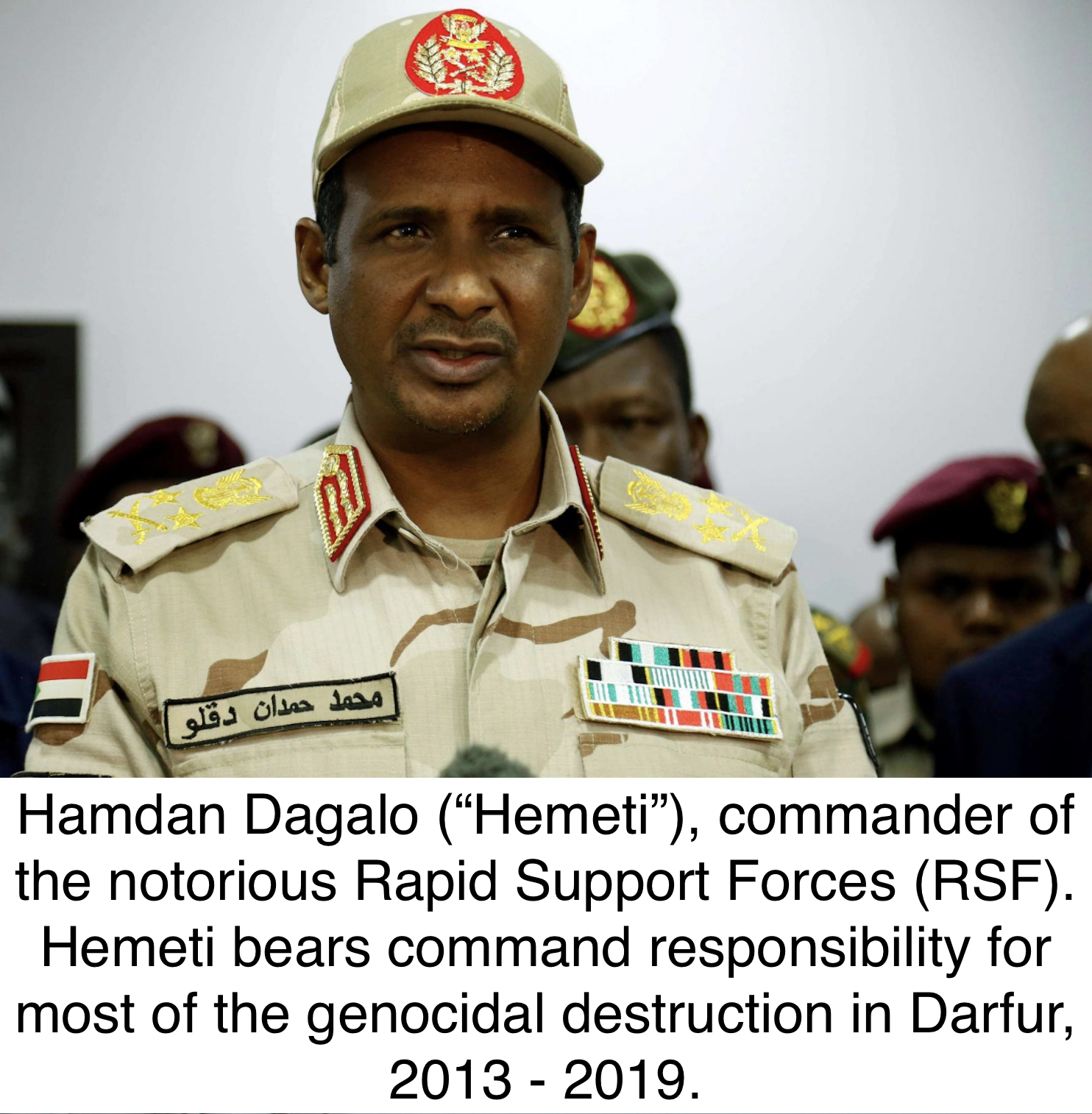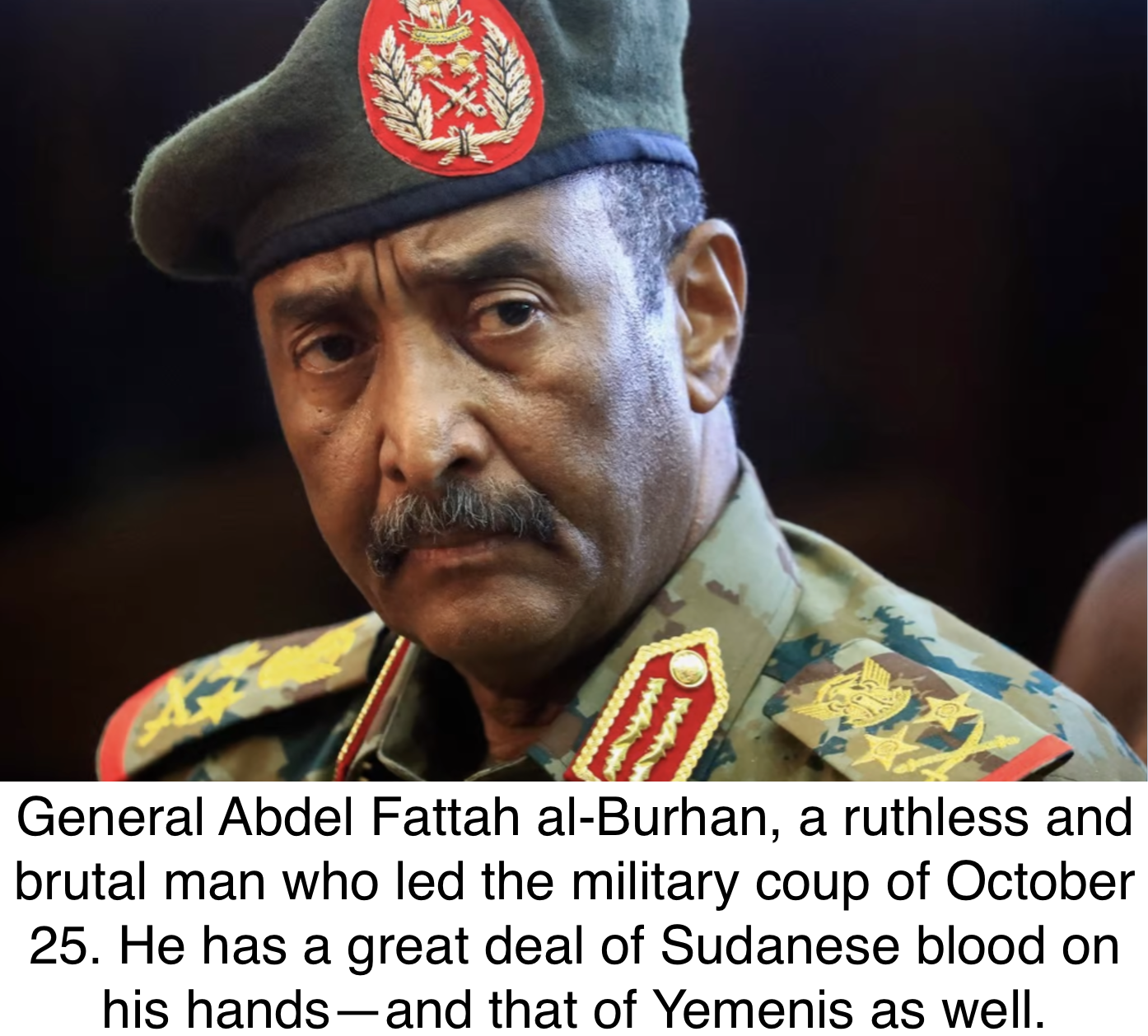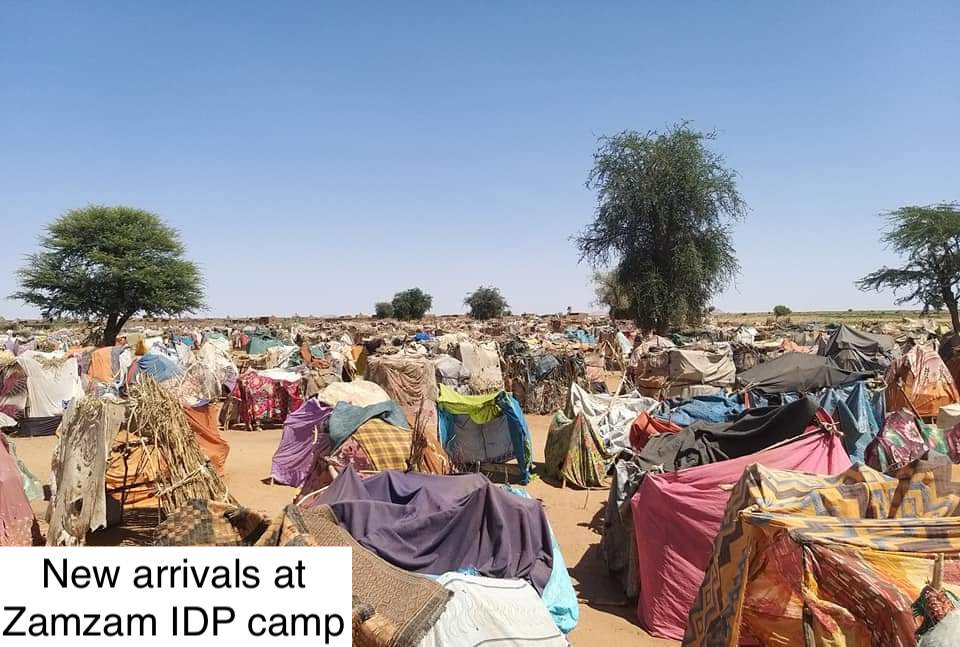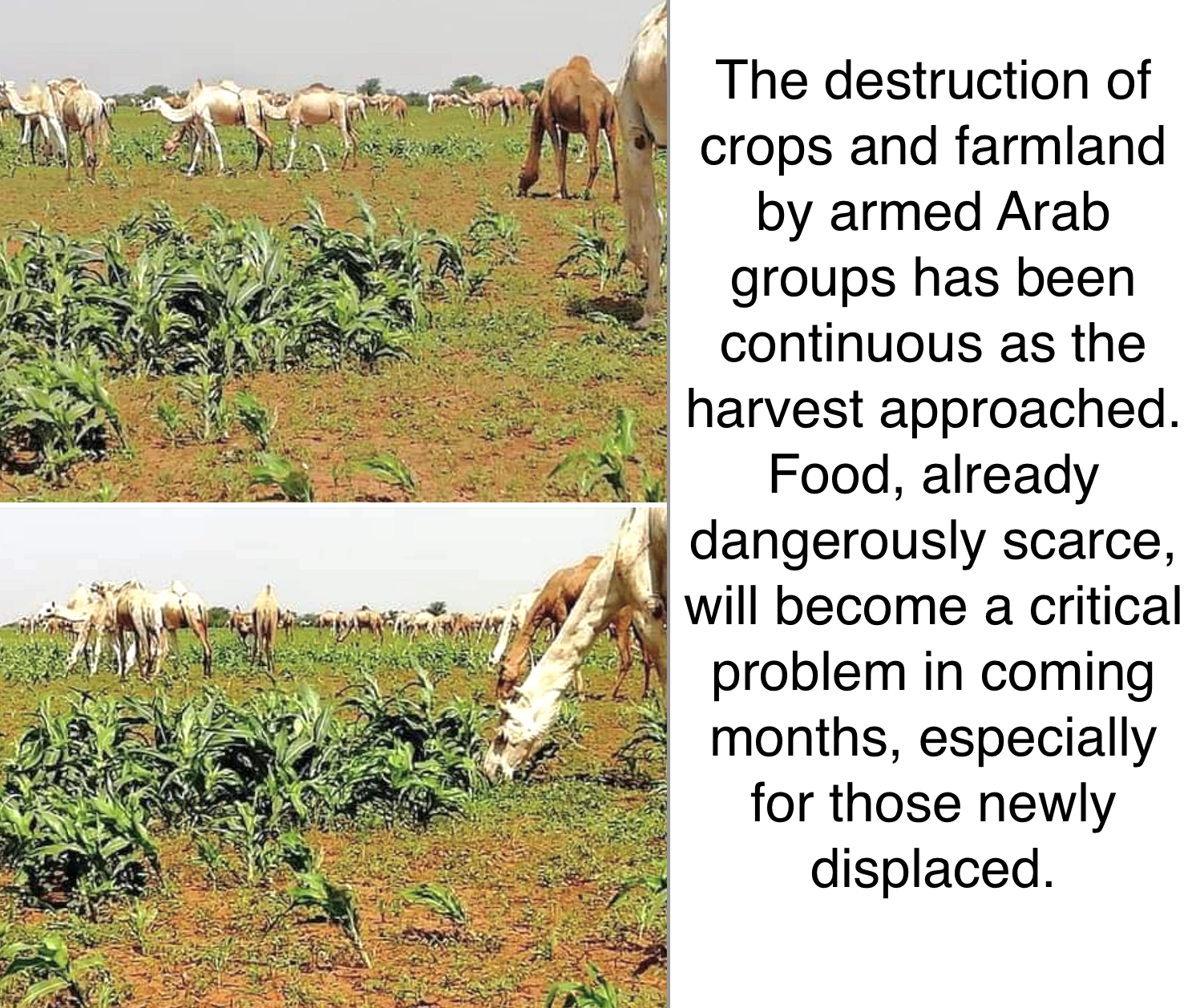Gaffar Mohammud Saeneen and Eric Reeves, Co-Chairs
Julie Darcq, Online Campaign Coordinator
Nancy Reeves, editor and financial facilitator
Overview (Eric Reeves
The current situation in Sudan, including Darfur and Zamzam IDP camp, is dominated by the reality of a military coup executed early Monday morning, October 25. The leader of the coup is General Abdel Fattah al-Burhan, previously head of the Sovereign Council, which was immediately dissolved by military force. Prime Minister Abdallah Hamdok was arrested, and later moved to house confinement. The civilian ministry heads have all been dismissed, as have many diplomatic personnel abroad. Amnesty International and Human Rights Watch, along with numerous other sources in Khartoum and elsewhere in Sudan, report on a growing number of arrests of activist leaders and journalists. Violent repression of protests has already claimed more than a dozen lives, with many more protestors wounded. The country-wide demonstrations scheduled for Saturday, October 30, will be massive, and energized by a predictable fury that transition to civilian governance has been completely halted.
International condemnation and pressure have been swift and forceful: the World Bank has broken off critical work to resuscitate Sudan’s moribund economy; the U.S. has suspended $700 million in aid to Sudan; foreign investment will quickly grind to a halt and work on debt relief will halt. It is unclear whether this matters to the generals. Al-Burhan has strong support from top military leaders and his deputy on the Sovereign Council, génocidaire Hamdan Dagalo (“Hemeti”), commander of the Rapid Support Forces (RSF). The RSF played a central and very bloody role in the effort to halt the people’s revolution of 2019; we may expect that he will play a central role in ongoing violent repression.
The standoff between civilians and the military is likely to be prolonged. Having seen their transitional civilian government swept away in a day, civilians are unlikely to compromise, but rather will hold out for full civilian governance and democratization. The military, perhaps misjudging the situation—both internally and internationally—have no way to back down without surrendering power. Nominally, even the Sovereign Council—controlled by the military since the August 2019 Constitutional Declaration—was scheduled to be turned over to civilian control in a matter of weeks. This fact may have been the catalyst for action in the wake of growing tensions in the past month between civilians in government and the military.
All of this has a bearing on the Project Responding to Sexual Violence in Darfur, and the efforts of Team Zamzam in Zamzam IDP camp and surrounding rural areas. The Rapid Support Forces, along with the armed Arab groups they enable, will almost certainly become more aggressive in a year that has already seen a tremendous uptick in internal displacement: there will likely be more than 300,000 newly displaced persons in Darfur by the end of the year.
Many of those displaced have been subject to extreme violence, including sexual violence. Zamzam IDP camp has already begun to see a large influx, even as the agricultural season in North Darfur has been disastrous: the rains were late in coming and the destruction of cropland by armed Arab groups has been tremendous. Large herds of livestock have been turned loose to forage on farms shortly before harvest; violence against farm owners and workers has been extreme, and sexual violence has again been all too prominent.
[For those interested in following the most recent events in Sudan, please see my Twitter feed (@SudanReeves). I now Tweet regularly through the day, calling attention to what I think are the most important reports, news dispatches, and other Tweets of particular significance. My 23 years of working on Sudan give me a good sense of how to assess information the manages to escape the relentless suppression of all media by the junta.]
Team Zamzam has continued to perform heroically throughout October, although communication has become increasingly difficult; and with the military coup, a complete shutdown of telecommunications and Internet access went into effect. This month’s Annex is as a consequence incomplete in rendering what has been achieved, although Gaffar is making a sustained effort to gather information as it becomes possible. Data as they exist at the moment are all in the Annex.
Here I should note that funding for our project going into the new year (2022) is uncertain, although every effort will be made to continue at the very least the provision of salaries for counselors and the necessary security personnel and food that will continue to be distributed to the very most impoverished and disabled, as well as widows with children and the very elderly. It is unclear whether the effort to provide surgical relief to girls and women suffering from traumatic fistulas will continue.
Contributions to the project can be made either directly to Eric or by way of purchase of one of his woodturnings (100% of the purchase price goes to the project in Zamzam):
- Eric Reeves | 31 Franklin Street, Northampton, Massachusetts. 01060 (US)
- www.ericreeves-woodturner.com
I would stress again that there is absolutely no overhead in the operation of this project: every dollar contributed, every dollar received from a woodturning purchase, goes directly to funding our work in Zamzam; the project has now brought critical assistance and hope to thousands of displaced persons.
Many have been in Zamzam for over 15 years and have seen a gradual withering of international interest in their lives and welfare. Many children have been born in the camp and know nothing but IDP camp life: poor schooling where it exists; a chronic lack of sufficient food; water shortages; grossly inadequate medical care. And too many girls and women, victims of horrific sexual violence, are completely without assistance except that provided by Team Zamzam. Although the Team’s primary mission remains psychosocial counseling, they have also provided pre- and post-operative care to the patients who undergo traumatic fistula surgery, allowing these patients to resume normal lives in most cases. Of 35 surgeries to date, 28 have been completely successful, and another seven patients have experienced significant improvement. These surgeries are very expensive by the standards of medical care in Darfur: approximately $500 per surgery with all costs considered. To understand just how debilitating traumatic fistulas can be for girls and women, please see here.
Before communications were shut down, Fatima (the coordinating counselor) provided these moving narratives (translated by Gaffar, who is from Darfur and has many family members in Zamzam):
This is a supplementary update concerning the well-being of fistula patients and their testimonies.
The general health condition:
Since the beginning of this month [October 1, 2021] to this date, the selected seven patients have received their surgical treatment. After the initial procedures of paperwork, there followed surgical treatment, medication, and psychological therapy. In the past, all of the selected patients are being treated at EGRAA SPECIALISED CENTRE, but we have shifted to NUBDA ELYAH Hospital. This new hospital provides excellent services, its initial procedures are quite flexible in comparison to others, and its members are highly professional with an excellent, friendly attitude towards people.
Our patients psychological condition following surgery is constantly improving and self-confidence is also rising significantly
Through our practical experience in the field, on daily and weekly basis, we always focus on making a thorough assessment to observe the patients’ psychological and physical well-being, both before and after treatment. We continually evaluate their progress. Of the patients who have benefited from this program since last year, the majority of them were able to restore their lives in a way that made us feel very proud of the efforts we have made. Thanks and great appreciation must go to all those who contributed in making this possible.
At present we have more than 70 girls and women are on the waiting list, and their physical and psychological conditions differ from one to the next. But the common denominator is that all of them are looking forward to treatment opportunities. The waiting list is long, the pain of fistula is agonising, and frustration for some of the patients is growing. But we are working hard alongside them to create a climate of psychological comfort. Within the team, we have a specialised cadre of six counselors who have been in a place since May 2021; they take full charge of the patients, with a 24/7 hotline operator to respond to all their concerns and needs.
Testimonies of the three fistula patients:
[1] “My name is Jara Arbab and, I’m 20 years old now. I am fine now and thank God and thanks for everyone who helped me to get a treatment, and my special thanks to my sisters of Team Zamzam who helped me with kind words and warm hugs. Had it not been for them and their constant attention, I would have still been in the bed that I have been in for almost a year and a half.
“[Ten days after my fistula surgery] the pain eased and I feel that I can do things that I have been denied in the past year and half. Now I can move and walk easily, I can wash my clothes, I can cook, and I can do many things. I missed so much going out with my friends, but now I can reward myself.
“The only thing I don’t want to do anymore is to go to our village in the countryside, where I went through this pain. They were two Janjaweed men riding camels and they had weapons. I was tied up for two days, each day they took turns on me many times; they laughed and spit on my face. I pray God punish them in this life and in the day of judgment. The same people did this to my friend from a neighbouring village two months after me. She nearly got her throat cut off and she has breathing problems and always complains about pain. When my friend’s uncle and older brother tried to get those people arrested, the next day they came in group to surround our village and all of them were armed. Everyone in the area got scared of them and they let it go.
“Thank you for helping me.”
[2] Testimony from patient’s mother:
“My name Khatira Ibrahim Ahmed, I’m 46 years old, mother of Hawa Galle Manis. Today I have come to congratulate you on the noble work that you are doing here, and I am carrying with me a warm message of appreciation and huge thanks from my family as well. If not for your programs, today my daughter will not be able to get up from her bed which she stayed for two years. bBut thank God today, after two years of depression, pain and isolation, she is now back to her normality.
“Last month when she was taken to clinic in El-Fasher [for fistula surgery], and I was finally relieved. I have the feeling that she will recover; thank God she returned well and with high confidence.
“What destroyed our confidence and emotional well-being was not the fistula injury itself but people around us in the neighbourhood, who whispered constantly about my daughter’s physical state. But now after talking to Sisters of Team Zamzam for two months, I feel quite relieved and happy—and so does my daughter.
“Here in Darfur, and especially in this camp, people are often ignorant about the reality of life in rural areas. People here don’t understand that in life one can gets sick, one can get killed, and my daughter is not any different from those many young girls who were raped by Janjaweed in their early teens. My daughter got sexually violated at the age of fifteen by a group of armed Janjaweed and for three she has been carrying that pain in silence. If you people from Team Zamzam weren’t here to encourage her to speak, she would have kept her ordeals in silence for the rest of her life. And this silence attitude is what is destroying lives of many young girls in the camps.
“I want you to go around to see other victims in their homes the same way you came to see us, because there are many victims in many houses in every neighbourhood. The other day when people heard about my daughter’s well-being, two families from my neighbourhood came to share with me the ordeals of their adolescence girls. The main problem here is, most of the times people feel ashamed and embarrassed to talk for something they are not guilty of, people must speak now if they want find solution for the stress. I thank you sisters for helping my daughter”.
[3] “My name is Kaltoum Youssif and I’m 25 years old now. I’m from Deriba village in Tawila locality. I have lived here in Zamzam for many years. I want thank sisters for helping me to gain my wellbeing. I got diagnosed with fistula three years ago and at first I thought that the pain would go away within a few weeks; that’s why I didn’t think to tell my family about my condition until my health condition became complicated last year.
“When my family learned about my health condition, I was subjected to psychological trauma and isolation from my friends, relatives and family. This has worsened my psychological condition to point of total breakdown. In addition to this, my husband divorced me without any reason and went away. The divorce has destroyed my entire life as I spent six months crying day and night.
“I didn’t know what I was suffering from until last year when I was taken to clinic by the help of relatives. The doctor said that it’s fistula in its early stage and it can be cured but we didn’t have enough money to pay admission fees for clinic. After that, I went back to the camp and continued my miserable life in pain and depression. The intensity of the pain forced me to think of suicide, because I hated living in pain and isolation. During my pain, all I wished for was that one day when I could find a way to heal myself and prove to my husband who left me without saying good-bye.
“Four months ago my life changed for the better when Sisters from Team Zamzam put my name on list for clinic. From the beginning I felt assured by their magical words and I knew my day would come. My treatment went as well as I expected and today for the first time in three years I slept well. Physically I now feel very satisfied, relieved, and psychologically very feel confident in myself. I just want hug every one of them. The sisters have not only helped me with their assuring words and the expenses of clinic, but they have managed to contact my husband who me left two years ago. He is working in South Sudan and I don’t know how they have managed to find his contact.
“It was a remarkable effort by the sisters and this has brought plenty of happiness to me. Since the divorce two years ago, I went through hell and all I want ever since was to give me a chance to explain my health situation, but he was gone. Today, thank God I heard his voice on the telephone after such a long time, and there is a possibility for us to resolve our misunderstanding for good.
“I thank everyone who contributed for my well-being. I thank sisters for rescuing me from hell of depression and mental distress. I thank them for mediating between me and my husband.”
Previous updates are archived at | https://www.ericreeves-woodturner.com/blog/



